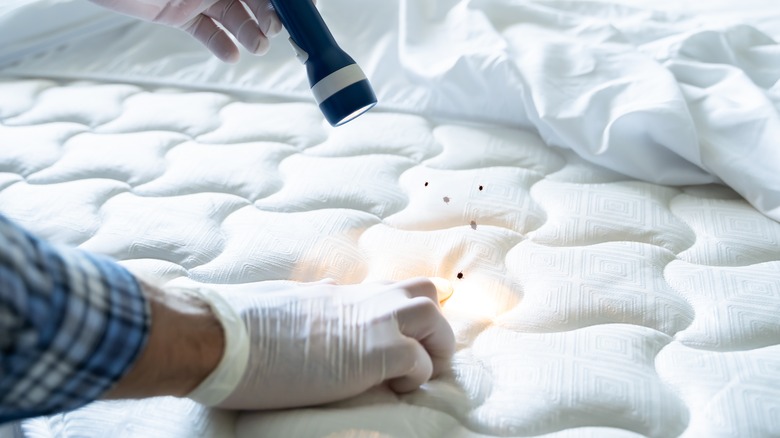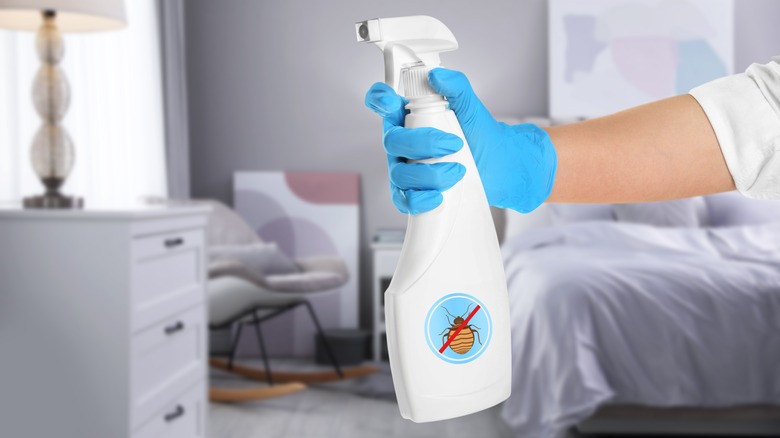If you’ve ever had the misfortune of dealing with an infestation of bed bugs, then you might be willing to try just about anything to get rid of these bloodthirsty pests. Bed bugs are tiny parasites that can live and breed in your bedding and survive by biting and feeding off of human blood, according to the Centers for Disease Control and Prevention. Bed bugs can be found just about anywhere. Because of their small thin bodies, they’re able to hide amongst clothes and luggage where they can be easily transported to other homes and hotels. You can tell if your home has been infested by the mess they leave behind and by spotting them hiding in the creases and folds of your sleeping area. Bed bugs leave coppery stains from their blood-filled feces and you may find bite marks on your body.
Once you have an infestation, you may be itching for solutions that will get rid of these critters for good. If the thought of having a pest control specialist come to your home and spray chemicals around your room has your skin crawling, you may think that more natural solutions are the key. Although baking soda is a fantastic all-around home cleaner because of its natural ability to cut through grease and stains, can it be used to rid your bedding of bed bugs? Let’s look closely and find out.
Will baking soda work on bed bugs?

Baking soda — or sodium bicarbonate — has properties that can easily whisk away surface stains, and can even be used to effectively remove odors and help disinfect your mattress. It also contains anti-fungal properties which can inhibit the growth of mold or mildew. However, when it comes to killing off an infestation of bed bugs, it is not an effective tool. There is no evidence that baking soda has the power of a commercial insecticide, according to Bed Bugs Insider. Although it can do an incredible job of removing the disgusting stains that bed bugs leave behind on your mattress, unfortunately, it won’t eradicate the underlying problem. Some believe that because baking soda takes the moisture out of whatever it is sprinkled on, then it might dehydrate the bed bugs or be toxic enough to kill them on contact. However, because bed bugs feed on blood, there would be no reason for them to ingest the compound.
Some are drawn toward natural solutions because they can’t afford the expensive treatments that a pest control professional offers. These treatments may come with a certain number of days guaranteed, but if the problem persists outside of that agreement then you may be stuck with the cost of another treatment. Also, because of the harsh chemicals involved, there is the worry that it may be toxic to young children and household pets as well.
Effective ways to treat bed bugs

Although natural solutions of baking soda and even vinegar are not effective in the fight to kill bed bugs, there are a few ways you can get rid of these blood-sucking pests for good. If you have the means, hiring a professional pest control company to take care of the situation may be your best defense against a full-blown bed bug infestation, especially if the problem has persisted for some time, enabling the critters to really settle in and breed. These types of services have the right chemicals to reach all of the nooks and crannies in your bed and surrounding area to get to all the critters that may be hiding, according to Healthline. They can also use heat treatments designed for the entire room to stop any further spread.
If you want to do the work yourself, there are plenty of over-the-counter pesticides that can do the trick. Furthermore, you can wash all of your clothes and bedding in a hot water cycle, then put them in the dryer on a high-heat setting. Wet or dry steam cleaners can also be used on your bed and around it to kill bed bugs, as per the U. S. Environmental Protection Agency. Persistence is key, as it may take several treatments to fully rid your home of these nasty little parasites.
